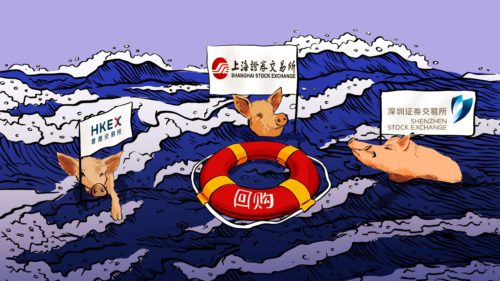China’s stock exchanges are delisting a record-high number of companies
More stringent financial standards and regulations have been implemented on China's stock exchanges to delist poorly performing companies, as well as zombie and shell companies.

From the start of 2021, when the Shanghai and Shenzhen Stock Exchanges implemented revised delisting standards, there has been a record high number of delistings in China. Some market participants have referred to the new standards as “the strictest delisting regulations in history.”
From the start of this year, a total of 45 companies (21 in Shanghai and 24 in Shenzhen) have so far been delisted or are soon to be delisted, and of the violation categories that can trigger a delisting (trading, financial, normative, and major violations), 80% of these delistings are based on financial indicators. The total delistings so far this year are almost double the number in all of last year, when 23 companies were delisted in the A-share market (14 in Shanghai and 9 in Shenzhen).
Some of the companies that have fallen by the wayside this year are well-known in China, for example:
- Prima Electronics 厦华电子, founded in 1985 and listed in Shanghai in 1995, manufactured China’s first plasma television.
- Henan Kedi Dairy 河南科迪乳业 once had ambitions of competing with Yili 伊利集团 and Mengniu 蒙牛集团, but amassed large debts and its founder was banned from the securities market for 10 years due to financial fraud.
- First listed in 2001, Shandong Jintai Group 山东金泰集团 was originally a pharmaceutical company producing traditional Chinese medicine and veterinary drugs, but fell into debt and became largely a shell company in 2003. The company reported negative net profits in 2020 and 2021, and issued a qualified audited report in 2021.
- Xin Jiang Ready Health Industry 新疆同济堂健康产业, listed on the A-share market in 2016, was found to have inflated its reported net profits and revenues in 2016 and 2017, and did not issue a financial report in 2021.
Of the 21 delistings so far in Shanghai, 17 were based on financial indicators, and three were voluntary delistings or restructings. One company, Xinjiang Yilu Wanyuan Industrial 新疆亿路万源实业, was delisted for fraud and evasion carried out in 2018 and 2019. Of the 24 delistings in Shenzhen, 22 were based on financial indicators.
The context
With the implementation of China’s new revised Securities Law from March 1, 2020 (which was six years in development), and successive additional revisions and regulations, China’s two exchanges have implemented more stringent financial standards and have started weeding out shell and zombie companies. There are three main financial delisting indicators:
- Negative net profits in the most recent fiscal year and revenues of less than 100 million yuan.
- Negative net assets at the end of the most recent fiscal year.
- Financial and accounting reports of the most recent fiscal year issued with a disclaimer or negative audit opinion.
These financial indicators clarify specific deductions that can be applied to operating income (aimed at limiting the scope of shell companies to evade regulations), and are intended to block attempts to increase revenues via improper accounting methods. On April 29, the China Securities Regulatory Commission issued further guidelines regulating the supervision of companies after they are delisted. Regulators continue to roll out a steady stream of new announcements, with the latest set of regulations set to take effect on June 20.
The process however, is still at an early stage: The average annual delisting rate of A-shares in China is less than 1%, compared with 6% on the New York Stock Exchange and 6.8% on the London Stock Exchange.
The takeaway
With more stringent securities legislation and regulations, Beijing has implemented a policy of “survival of the fittest” on China’s stock exchanges, which are aiming to whittle out poorly performing companies, as well as zombie and shell companies.






